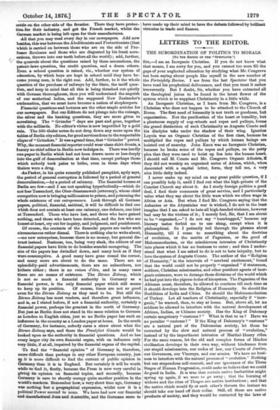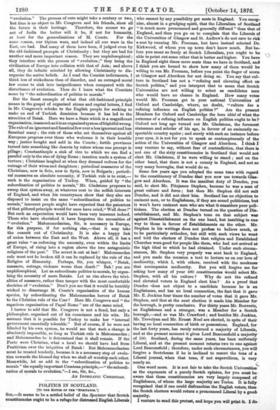LETTERS TO THE EDITOR.
THE SUBORDINATION OF POLITICS TO MORAIS.
[TO THB EDITOR OF THE "SPECTATOR."]
SIR,-I am an Inorganic Christian. If you do not know what that means, I am sorry for you, and you cannot too soon fill the gaps of your neglected education by studying what Mr. Congreve has been saying about- people like myself in the new number of the Fortnightly Review. I see from the last Spectator that you have read his prophetical deliverance, and that you treat it rather irreverently. But I doubt, Sir, whether you have extracted all the theological juices to be found in the latest flower of the system which is to supplant Christianity in a little while.
An Inorganic Christian, as I learn from Mr. Congreve, is a Christian who does not happen to be attached to the Church of Rome. The first need of humanity is not truth or goodness, but organisation. Not the purification of the heart or humility, but a plenteous supply of cog-wheels and ropes and pulleys, forms the grand distinction of such Christianity as Auguste Comte and his disciples take under the shadow of their wing. Ignatius Loyola was an Organic Christian of the first class, because he multiplied the ropes and pulleys by which human beings are hoisted out of anarchy. John Knox was an Inorganic Christian, because he broke some of the ropes and pulleys, on the petty plea that they were used to hoist up lies into the human heart. I should call M. Comte and Mr. Congreve Organic Atheists, if they did not worship an organised series of Atoms, which, when decorated with a capital letter, form, they tell me, a very nice little deity indeed.
I never make up my mind on any great public question, if I can possibly help it, until I find out what the high-priests of the Comtist Church say about it. As I study foreign politics a good deal, I find their comments of great service, and I particularly value what they say about the little wars which we often wage in Africa or Asia. But when I find Mr. Congreve saying that the Ashantee or the Abyssinian war is wicked, I do not in the least imagine that I am asked to hate all high-handed violence, however bad may be the victims of it ; I merely feel, Sir, that I am about to be "organised,—" I do not say "humbugged," because my literary tastes forbid me to use slang, except when it is philosophical. So I patiently toil through the phrases about Humanity, till I come to something about the doctrine of evolution, or the merits of Paganism, or the good of Mahommedanism, or the mischievous intrusion of Christianity into places which it has no business to enter ; and then I under- stand that what I am asked to do is not to hate iniquity, but to love the system of Auguste Comte. The author of the "Religion of Humanity," in the intervals of "cerebral excitement," found that the world could not be properly " organised " if statesmen, soldiers, Christian missionaries, and other pestilent agents of inor- ganic existence, were to derange those divisions of the world which he had put into the pigeon-holes of his system. The Paganism of the Africans must, therefore, be allowed to continue till such time as it should develope into the Religion of Humanity. So should the Buddhism of India and China. So should the Mahommedanism of Turkey. Let all teachers of Christianity, especially if "inor- ganic," be warned, then, to stay at home. But, above all, let no soldiers be allowed to interfere with the natural development of African, Indian, or Chinese society. Has the King of Dahomey certain sanguinary " customs ? " What is that to us ? Have we no peculiar " customs ? " If the King of Dahomey's "customs" are a natural part of the Dahomeian society, let them be corrected by the slow and natural process of "evolution," instead of by the impertinent intrusion of Martini-Henry rifles. For the same reason, let the old and complex forms of Hindoo civilisation develope in their own way, without hindrance from our stupid missionaries, our codes of law, our Courts of Justice, our Governors, our Viceroys, and our armies. We have no busi- ness to interfere with the natural process of "evolution." Nothing but our stupendous self-conceit, and our ignorance of the Three Stages of Human Progression, could make us believe that we could do good in India. It is true that certain native barbarities might spring up again, if we were to go away ; that the burning of widows and the rites of Thugee are native institutions ; and that the native chiefs would fly at each other's throats the instant we should take our hand off their collar. Still, all these are native products of society, and they would be corrected by the laws of "evolution." The process of cure might take a century or two, but time is no object to Mr. Congreve and his friends, since all the future is their heritage. Therefore, the sooner we go out of India the better will it be, if not for humanity, at least for the generalisations of M. Comte. For the same reason, our Opium wars, and indeed all our wars in the East, hre bad. Bad many of them have been, if judged even by the old-fashioned precepts of Christianity ; but they are bad for another and more important reason. They are unphilosophical ; they interfere with the process of "evolution ;" they bring the civilisation of Europe into collision with that of Asia; and above all, they do infinite mischief by allowing Christianity to dis- organise the native beliefs. As I read the Comtist indictments, I think less of wickedness than of disorder, and an outraged moral law seems to sink into insignificance when compared with the disturbance of evolution. Thus do I learn what the Comtists mean by "the subordination of polities to morals."
But the finest example of what that old-fashioned principle means in the gospel of organised atoms and capital letters, I find in Mr. Congreve's rebuke to the English people for seeking to make an end of Turkish dominion because it has led to the atrocities of Batak. Here we have a State which is a magnificent organisation, inasmuch as it is an organised system of frightful wrong. The rule of an ignorant and fanatical few over a less ignorant and less fanatical many ; the rule of those who set themselves against all European progress over those who welcome it in their humble way ; justice bought and sold in the Courts ; fertile provinces turned into something like deserts by rulers whose one precept is pillage ; Constantinople a sink of vice to which we can find a parallel only in the sins of dying Rome ; taxation made a system of torture ; Christians laughed at when they demand redress for the outrage of their wives and daughters ; periodical massacres of the Christians, now in Scio, now in Syria, now in Bulgaria ; periodi- cal massacres an absolute necessity, if Turkish rule is to exist,— such is the organisation of Turkey. When, guided by "the subordination of politics to morals," Mr. Gladstone proposes to sweep that system away, at whatever cost to the selfish interests of England, and when his countrymen show that they also are disposed to insist on the same "subordination of politics to morals," innocent people might have expected that the patentees of that pilfered principle would for once have cried," Well done !" But such an expectation would have been very innocent indeed. Those who have cherished it have forgotten the necessities of "evolution." Mahommedanism, Sir, is necessary in Europe, for this purpose, if for nothing else,—that it may take the conceit out of Christianity. It is also a happy link of union between the East and the West. Above all, it has a great value "as enforcing the necessity, even within the limits of Europe, of rising into a region above the two antagonistic religions of the past." The secret is out at last! Mahommedan rule must not be broken till it can be replaced by the rule of the Religion of Humanity. Perhaps, Sir, you whisper, "Batak, massacre, outrage, violence worse than death !" Bah ! you are unphilosophical. Let us subordinate politics to morals, by organ- ising the necessity of more Bataks. Let us rise above the trivi- alities of massacre, rather than tamper with the most comfortable doctrine of "evolution." Don't you see that it would be horribly wicked to disarrange M. Comte's organisation of the human species, by subordinating the Mahommedan heroes of Batak to the Christian rule of the Czar? Here Mr. Congreve and "the sagacious organisation of Papal Rome" are of the same mind.
I hasten to add that Mr. Congreve is not a fiend, but only a philosopher, organised out of his conscience and his wits. He assumes that it is possible for Turkey to make her "internal government essentially tolerable." But of course, if he were not blinded by his own system, he would see that such a change is absolutely impossible, 80 long as Turkish rule is Mahommedan ; and Mahommedan he is determined that it shall remain. If the Porte were Christian, what a howl we should have had from Positivism over the iniquities of Batak ! But Mahommedanism must be treated tenderly, because it is a necessary step of evolu- tion towards the blessed day when we shall all worship each other. Meanwhile, let us add to the "subordination of politics to morals" the equally important Comtean principle,—" the subordi- nation of morals to evolution."—I am, Sir, &c., AN INORGANIC CHRISTIAN.



































 Previous page
Previous page